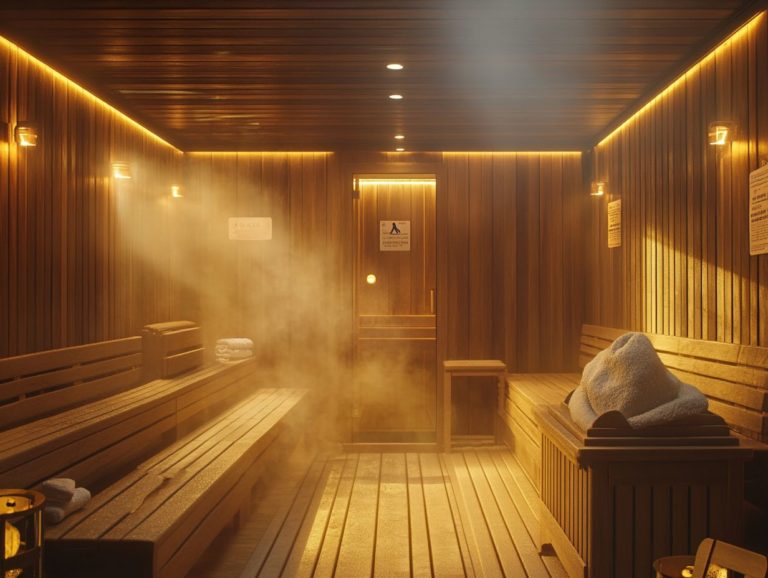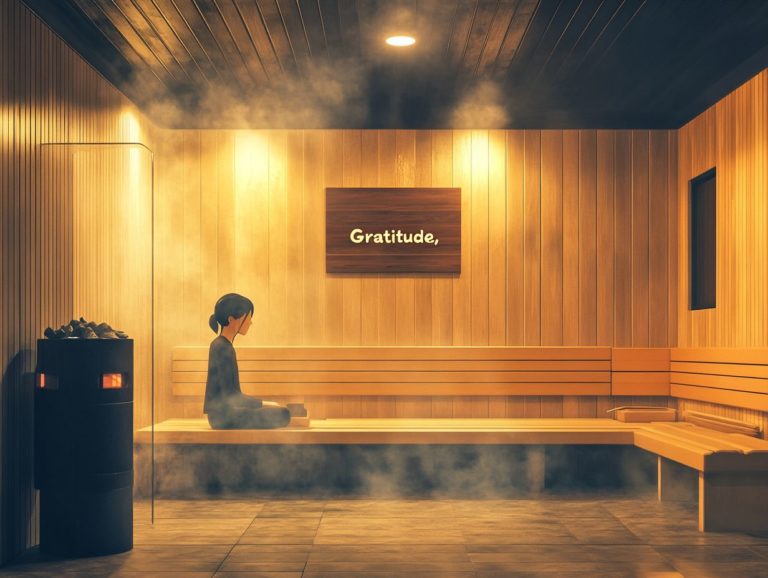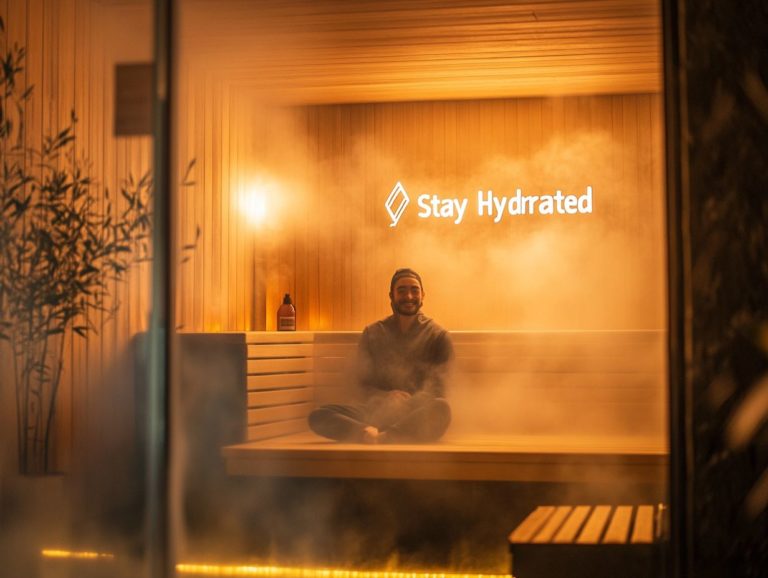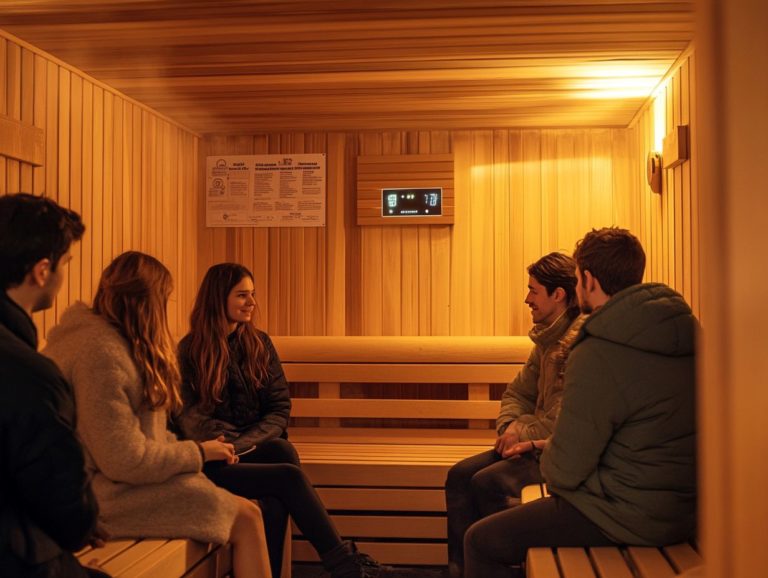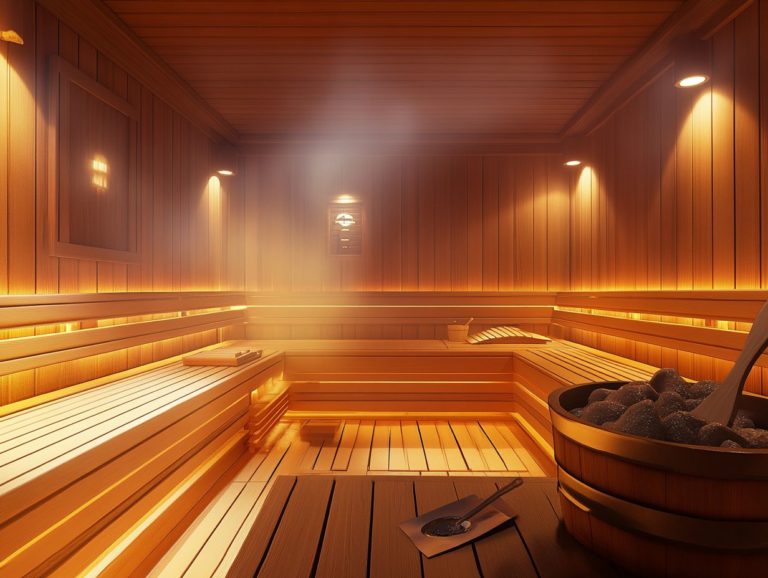Sauna Use for the Elderly: Safety Measures
Sauna use offers impressive health benefits for the elderly. Key areas include cardiovascular health, relaxation, and pain management.
Engaging in regular sauna bathing can be a powerful ally in your fight against chronic pain. It significantly enhances your well-being while lowering the risk of cardiovascular disease.
The therapeutic effects of both traditional and infrared saunas can elevate your quality of life as older adults often encounter various health challenges.
Contents
- Potential Risks of Sauna Use for the Elderly
- Key Takeaways:
- Safety Measures for Sauna Use
- Alternative Ways for Seniors to Reap the Benefits of Sauna
- Frequently Asked Questions
- What are the potential risks of sauna use for the elderly?
- Are there any precautions that elderly individuals should take before using a sauna?
- What temperature and duration of sauna use is recommended for the elderly?
- What measures can be taken to ensure safety while using a sauna for the elderly?
- Are there certain medications that should be avoided before using a sauna for the elderly?
- Can sauna use be beneficial for the elderly?
Improved Cardiovascular Health
Improved cardiovascular health stands out as one of the most significant benefits of sauna use for you, especially as you age. Regular sessions can lead to lower blood pressure and reduced hypertension.
Research indicates that consistent sauna bathing can enhance your overall heart function. Clinical findings published by the American College of Cardiology show that individuals who indulge in sauna sessions enjoy improved blood circulation and a substantial decrease in the risk of cardiovascular disease.
The warmth of the sauna promotes the widening of blood vessels, which helps deliver essential oxygen and nutrients to your heart and muscles. This boosts your heart health while alleviating strain on your cardiovascular system.
Mental and Emotional Well-being
Using a sauna is a wonderful way to enhance your mental and emotional well-being during your golden years. It promotes relaxation and reduces stress key factors in combating neurocognitive diseases like dementia and Alzheimer s.
Research shows that spending time in a sauna can significantly lower cortisol levels, allowing you to unwind profoundly. This isn t just about finding tranquility; it s also a chance to socialize. Many people cherish sauna sessions as shared experiences with friends or family, which can help combat feelings of isolation often tied to cognitive decline.
Ultimately, regular sauna bathing can strengthen cognitive resilience and may even offer protective benefits against memory-related disorders, enhancing your overall quality of life.
Potential Risks of Sauna Use for the Elderly
While sauna use presents numerous health benefits, it s essential for you to consider the potential risks for older adults. Factors such as dehydration and adverse effects on existing health conditions, like pulmonary disease and chronic bronchitis, are important to keep in mind.
Understanding these health risks is vital for ensuring that sauna bathing remains a safe and effective choice for older individuals seeking relaxation and health improvements. To enhance safety, it’s important to follow guidelines such as sauna safety communication.
Key Takeaways:
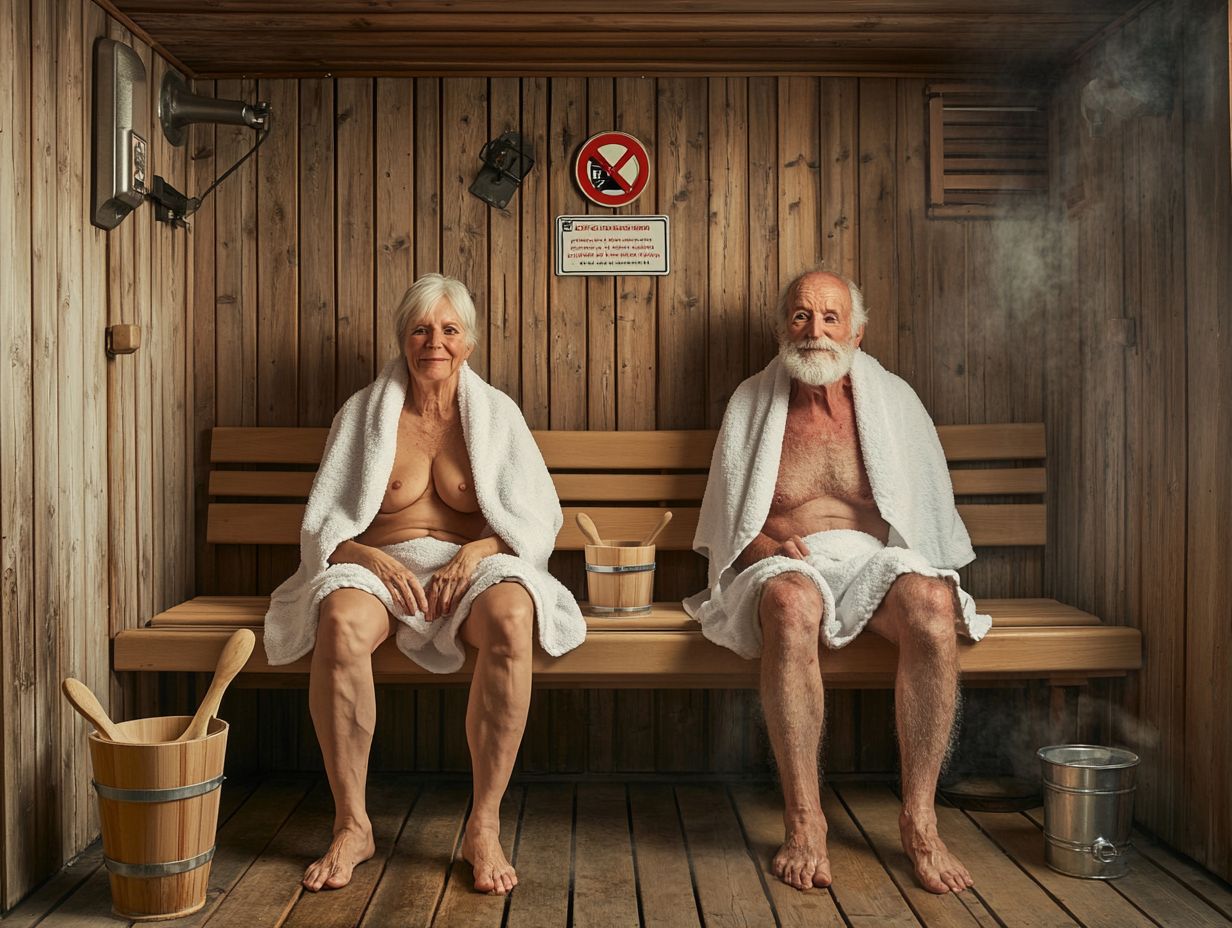
- Sauna use improves cardiovascular health and mental well-being for seniors.
- Seniors should be aware of risks like dehydration and medication interactions.
- Proper preparation and monitoring are essential for safety.
- Consider low-heat saunas and relaxation techniques as alternatives.
Increased Risk of Dehydration
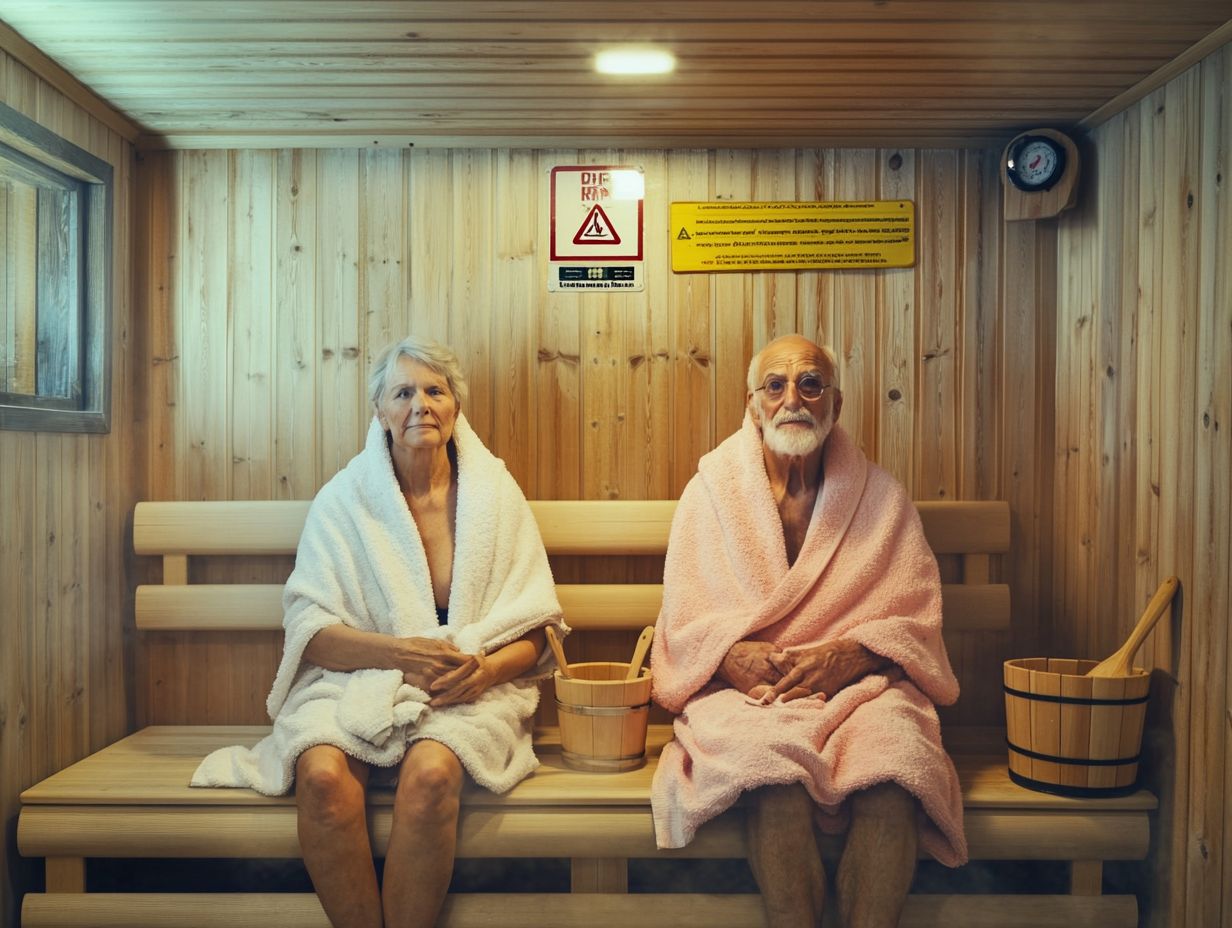
One of the significant risks of sauna use for older adults is the heightened chance of dehydration, which can lead to serious health complications if not addressed appropriately.
As you age, your body may find it harder to regulate temperature. This makes you more susceptible to the negative effects of intense heat.
Symptoms of dehydration include dizziness, dry mouth, confusion, and an increased heart rate. These signs indicate immediate action is needed.
For older individuals, this can also heighten the risk of falls or other accidents, adding to the urgency of the situation.
Thus, it s essential for caregivers and family members to implement effective hydration strategies. Encouraging fluid intake before and after sauna sessions can help mitigate these risks and promote overall health.
Impact on Medications and Health Conditions
Using a sauna can significantly impact your medications and health conditions.
This is especially true for elderly individuals dealing with hypertension or pulmonary disease.
As you seek relief and relaxation, it’s crucial to be aware of the risks associated with combining sauna bathing and your prescribed treatments. The high heat and humidity in a sauna can affect how your body metabolizes certain medications, potentially leading to unwanted side effects. For additional information, you may want to explore sauna safety resources that can help you navigate these concerns.
For example, if you re taking diuretics (medications that help reduce fluid in the body) to manage high blood pressure, prolonged sauna sessions could increase your risk of dehydration. Likewise, respiratory medications might not work as effectively in such heated environments.
Therefore, it’s essential to consult with healthcare professionals about your sauna practices, ensuring that your health regimen remains both safe and effective.
Safety Measures for Sauna Use
Implementing safety measures is crucial for ensuring a safe and enjoyable sauna experience for the elderly, particularly when it comes to monitoring health and hydration levels throughout their session.
By adhering to recommended practices, seniors can relish the many benefits of sauna bathing while effectively minimizing any potential risks.
Preparing for Sauna Sessions
Preparation is essential for you if you’re an elderly individual considering the benefits of a sauna. It’s important to address any health concerns and ensure you re well-hydrated before entering. This boosts your experience and minimizes risks!
Before entering the sauna, consult your healthcare professional. They can evaluate your cardiovascular health and any existing health issues, such as high blood pressure or respiratory issues.
Proper hydration is critical. Aim to drink water or electrolyte-rich beverages at least an hour before your session. Keeping track of your fluid intake throughout the day is vital in preventing dehydration.
Starting with shorter sessions around 5 to 10 minutes is advisable to help your body acclimate to the heat. Regular breaks can further enhance your comfort and safety, allowing you to fully enjoy the sauna experience.
Monitoring Health and Hydration Levels
Monitoring health and hydration levels during sauna use is crucial for you, especially if you’re among the elderly, to prevent any adverse effects and ensure a truly positive experience.
Pay attention to your body’s signals. Feeling lightheaded or unusually weak might indicate dehydration or overheating.
Regular breaks are also essential; they allow your body to cool down and rehydrate effectively.
Keeping a water bottle nearby ensures that you have easy access to fluids, promoting a consistent hydration routine. Tracking your heart rate and sweat output offers valuable insights into how well your body is adapting to the heat.
By prioritizing these methods, you can fully enjoy the numerous health benefits of sauna sessions without compromising your well-being.
Alternative Ways for Seniors to Reap the Benefits of Sauna
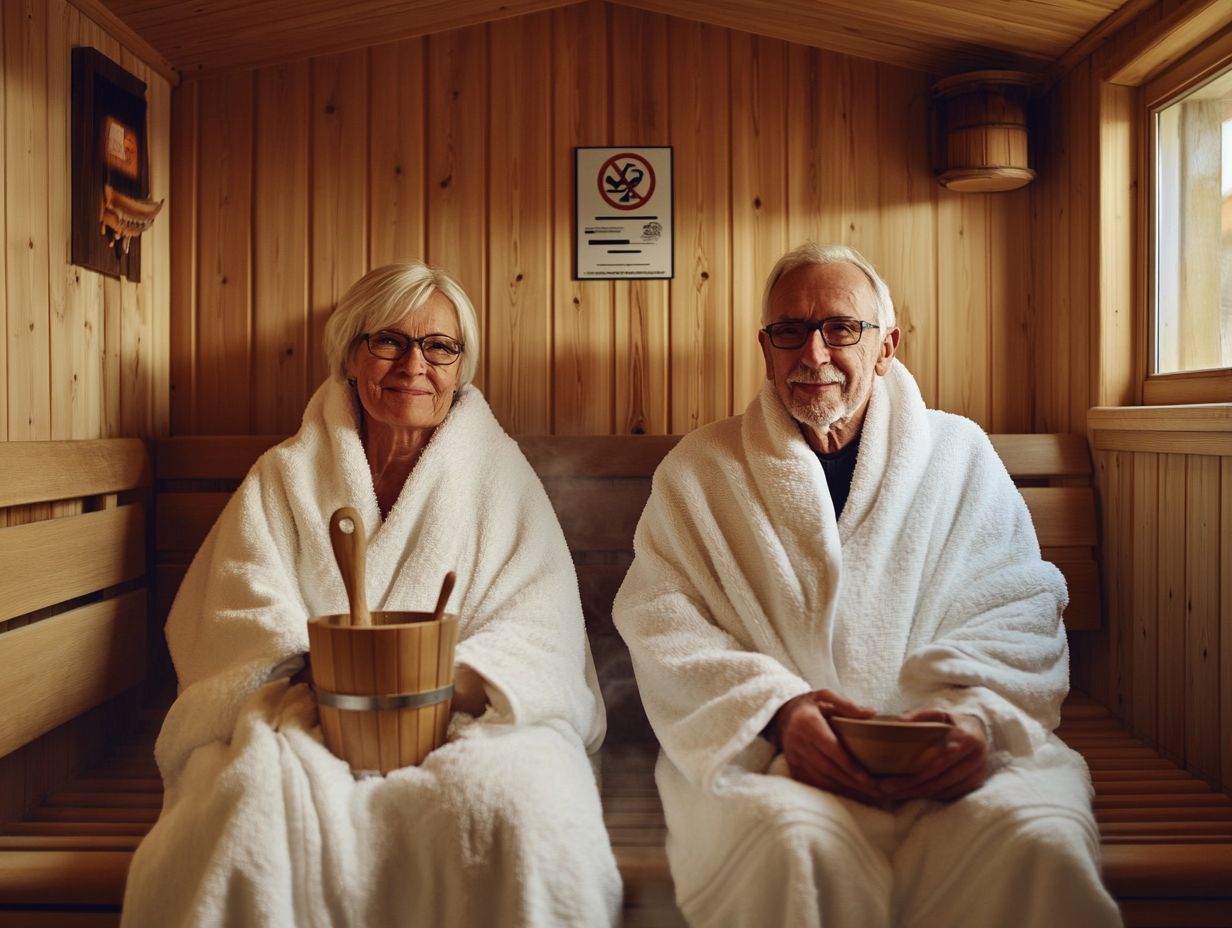
For seniors facing challenges with traditional sauna use, consider alternative methods such as low-heat saunas and steam rooms. These options offer substantial health benefits while ensuring a comfortable and enjoyable experience.
Low-heat Saunas and Steam Rooms
Low-heat saunas and steam rooms provide a gentle alternative, allowing you to explore relaxation and health benefits without the intense heat of traditional saunas.
These soothing environments create a calm atmosphere that enhances cardiovascular health, promotes muscle relaxation, and alleviates stress. Unlike conventional saunas that might feel overwhelming, the milder temperatures offer a welcoming experience, especially for those with sensitive skin or respiratory concerns. It’s also vital to be aware of sauna safety to ensure a safe and enjoyable experience.
With adjustable humidity and comfortable seating, you can take your time and savor each moment at your own pace. Incorporating natural elements, like herbal infusions, can elevate your well-being even further, providing soothing aromatherapy benefits that enhance relaxation.
This enjoyable and restorative practice significantly contributes to both your physical and mental health.
Other Relaxation Techniques for Elderly Individuals
In addition to enjoying the benefits of sauna use, you can enrich your relaxation routine with various techniques that promote well-being and relieve stress.
Incorporate meditation into your routine; it encourages mindfulness and clears your mind, helping you achieve a deeper sense of peace and clarity. Gentle exercises like tai chi or yoga are wonderful additions that enhance flexibility and improve circulation, perfectly complementing the soothing heat of the sauna.
Breathing exercises are vital for lowering stress levels, fostering a sense of calm and grounding. By integrating these practices, you’ll feel a wave of relaxation wash over you, contributing to a more fulfilling and balanced lifestyle.
Frequently Asked Questions
What are the potential risks of sauna use for the elderly?
Some potential risks of sauna use for the elderly include dehydration, dizziness, and falls due to changes in blood pressure and heat intolerance.
Are there any precautions that elderly individuals should take before using a sauna?
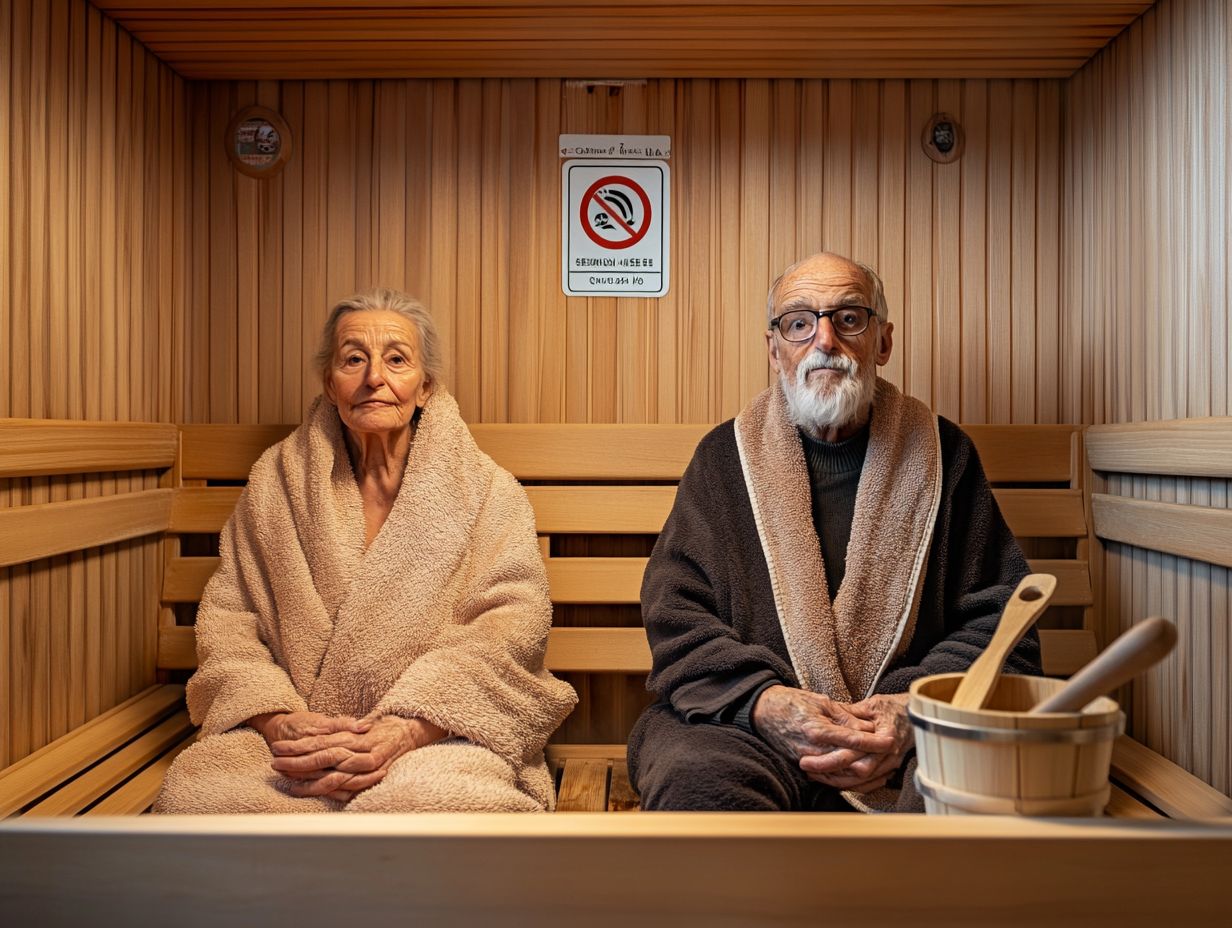
Absolutely! It s wise for elderly individuals to chat with their healthcare provider before diving into sauna use and to avoid it if they have any underlying health conditions.
What temperature and duration of sauna use is recommended for the elderly?
The sauna temperature for elderly individuals should not exceed 140 degrees Fahrenheit, and the duration should be limited to 15-20 minutes.
What measures can be taken to ensure safety while using a sauna for the elderly?
Elderly individuals should always have a companion present while using a sauna, ensure proper hydration, and gradually increase the duration and temperature of sauna use over time.
Are there certain medications that should be avoided before using a sauna for the elderly?
Yes, medications that can affect blood pressure or increase the risk of dehydration, such as diuretics, should be avoided before using a sauna.
Can sauna use be beneficial for the elderly?
Yes! Sauna use can provide health benefits for the elderly, such as improved circulation, reduced muscle pain, and better sleep. However, it s important to take necessary safety measures and consult with a healthcare provider beforehand.

